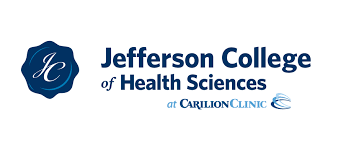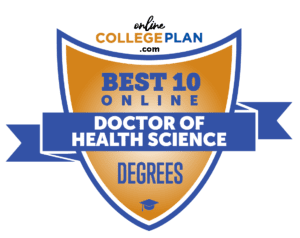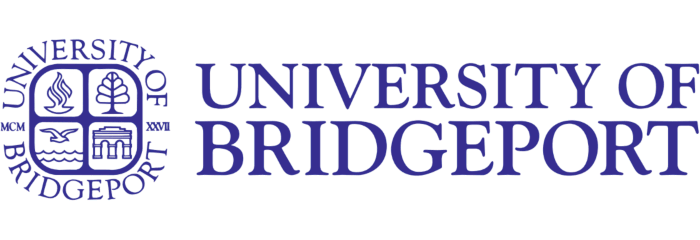Online Doctor of Health Sciences

Jefferson College of Health Sciences is a private, health education-centered college that has a main campus in Roanoke, Virginia. Close to 1,000 students pursue health-related degrees at the associates through doctoral levels at the school.
Twenty-five degree programs are offered at all levels including courses of study in nursing, community health, rehabilitation, physical therapy, and the arts and sciences. At the end of the 2018-2019 school year, Jefferson College of Health Sciences will merge with Radford University. Though as of now it appears they will continue to offer the same academic programming. Academic quality indicators at the college are high quality and include an 8 to 1 student-to-faculty ratio and a 68% retention rate.
The online health sciences doctorate (D.H.Sc.) offered by Jefferson College of Health Sciences places in our ranking due to flexibility-enhancing program components as well as the overall quality of the academic instruction and support in the program.
Students in the program may choose from a variety of in-demand industry-centered concentrations including tracks in health care administration, community and public health, or education and academia related to health sciences.
For regional students, Jefferson College of Health Sciences is partnered with Carillion Clinic for practicum hours completion. Carillion Clinic is a 17,000 person health care system spanning several hundred miles.
Online Doctor of Health Science Degree FAQs
Even with all the information on the high-quality doctor of health science degrees to explore above, we realize many future students will have additional questions on the degree. Below we’ve tackled some of the most common questions future applicants have about online Doctor of Health Science degrees.
What does DHSC Stand For?
As opposed to Doctor of Philosophy (Ph.D.) in health sciences degrees, DHSC (or D.H.Sc.) degrees are professional doctorates in health sciences.
 In short, DHSC stands for Doctor of Health Sciences. Doctor of Health Science degrees are professional doctorates, meaning not all programs will require a dissertation or have a central goal of helping students to perform original research. In contrast to research doctorates like a Ph.D. in Health Sciences, professional doctorates focus more on immediately applicable career-centered knowledge.
In short, DHSC stands for Doctor of Health Sciences. Doctor of Health Science degrees are professional doctorates, meaning not all programs will require a dissertation or have a central goal of helping students to perform original research. In contrast to research doctorates like a Ph.D. in Health Sciences, professional doctorates focus more on immediately applicable career-centered knowledge.
While some DHSC degrees also require a dissertation, many rely on practicums, internships, or capstone projects to showcase the newly acquired knowledge of soon-to-graduate students.
 DHSC degrees are interdisciplinary, drawing from a number of graduate-level disciplines including advanced clinical practitioner courses, research methods in health settings, health education courses, and applied courses in health delivery optimization. Most DHSC degrees require students to have already completed a terminal master’s or doctorate in another discipline.
DHSC degrees are interdisciplinary, drawing from a number of graduate-level disciplines including advanced clinical practitioner courses, research methods in health settings, health education courses, and applied courses in health delivery optimization. Most DHSC degrees require students to have already completed a terminal master’s or doctorate in another discipline.
What is your title if you have a doctorate in health sciences?
 All recipients of a doctoral degree may elect to include “Dr.” in their official salutation. This is the case whether you gain a Doctor of Philosophy (Ph.D.) degree, a professional doctorate like a Doctor of Business Administration (D.B.A.), or a medical doctoring degree (M.D.).
All recipients of a doctoral degree may elect to include “Dr.” in their official salutation. This is the case whether you gain a Doctor of Philosophy (Ph.D.) degree, a professional doctorate like a Doctor of Business Administration (D.B.A.), or a medical doctoring degree (M.D.).
To differentiate between types of doctoral degrees, salutations of doctoral degree recipients commonly end with the specific degree they have obtained.
Some examples include:
- Dr. Joe Smith, O.D.
- Dr. Jan Smith, D.Eng
- Dr. Jason Clark, Ph.D.
As with the above example, those pursuing a doctoral degree in health sciences will end up with the following titles upon graduation (depending on their degree path).
- Dr. Joe Smith, Ph.D.
- Dr. Joe Smith, D.H.Sc.
While all doctoral degree recipients are doctors, one should note that doctor of health sciences are not medical doctors just because of their D.H.Sc. degree. Some D.H.Sc. degree recipients may already hold an M.D. However, just because D.H.Sc. recipients have a doctorate degree in a medical field does not make them medical doctors.
 Secondly, if by title one is wondering what role a recipient of a Doctor in Health Sciences degree performs, the answer is ‘it varies.’ Most Doctor of Health Science degrees offer multiple specializations that may lead to advanced medical practitionership for a nurse or doctor, an education track for nurse educators, public health educators, and professors, and a research track.
Secondly, if by title one is wondering what role a recipient of a Doctor in Health Sciences degree performs, the answer is ‘it varies.’ Most Doctor of Health Science degrees offer multiple specializations that may lead to advanced medical practitionership for a nurse or doctor, an education track for nurse educators, public health educators, and professors, and a research track.
How long is a post-doctorate in health sciences?

Though you sometimes see “post-doctorate” mentioned in relation to doctorates in health science, a more typical occurrence is that doctorates in health science are post-professional degrees.
Professional degrees occur at the master’s and doctoral levels. They are typically terminal degrees that prepare recipients to practice one particular career type. In the case of a doctorate in health sciences, applicants are almost always required to have a professional degree upon entrance.
This degree can be a Master of Science in Nursing, a Ph.D., a doctor of medicine degree, or another. Regardless, the length of time required to complete a doctorate in health sciences is typical for other types of doctorates. The quickest programs may be completed in 3-4 years, with some programs taking closer to 6 years for completion.
The reason we mention the above post-professional requirement is that very few health science doctorates (if any) include a postdoctoral component. Some future students confuse postdoctoral with post-professional, which is the common entry requirement for a doctor in health sciences degree.
The amount of time required to complete a doctorate in health sciences in typical of other doctorate types: 3-6 years depending on the program and its requirements.
What can I do with a PhD in health science?
Health science doctorates come in two varieties: Doctor of Philosophy (Ph.D.) in Health Sciences degrees and Doctor of Health Sciences (D.H.Sc.) degrees. Both can be quite similar. Though there is one difference.
D.H.Sc. degrees are often professional doctorates, geared towards providing career knowledge. Some D.H.Sc. degrees require dissertations and support original research, but some do not.
 On the contrary, Ph.D. programs in the health sciences always hold an original research component. The writing and defense of dissertations is a central component to achieving a Ph.D. and a central goal of Ph.D. programs is to prepare students to teach at the university level.
On the contrary, Ph.D. programs in the health sciences always hold an original research component. The writing and defense of dissertations is a central component to achieving a Ph.D. and a central goal of Ph.D. programs is to prepare students to teach at the university level.
With this said, both Ph.D. programs and D.H.Sc. programs can lead to the same careers. Most health science doctorates have specializations in education, research, and advanced clinical knowledge. These specializations can advance careers as:
 Medical Practitioners (of a variety of types)
Medical Practitioners (of a variety of types)- Researchers
- Medical Educators
- Leaders within Health Care Organizations
- Professors
While the above careers are achievable with both Doctor of Health Science and Doctor of Philosophy in Health Science degrees, students should be aware that Ph.D. programs do have a greater emphasis on original research. This can help to prepare students even better for careers centered around research.


















 In short, DHSC stands for Doctor of Health Sciences. Doctor of Health Science degrees are professional doctorates, meaning not all programs will require a dissertation or have a central goal of helping students to perform original research. In contrast to research doctorates like a Ph.D. in Health Sciences, professional doctorates focus more on immediately applicable career-centered knowledge.
In short, DHSC stands for Doctor of Health Sciences. Doctor of Health Science degrees are professional doctorates, meaning not all programs will require a dissertation or have a central goal of helping students to perform original research. In contrast to research doctorates like a Ph.D. in Health Sciences, professional doctorates focus more on immediately applicable career-centered knowledge. DHSC degrees are interdisciplinary, drawing from a number of graduate-level disciplines including advanced clinical practitioner courses, research methods in health settings, health education courses, and applied courses in health delivery optimization. Most DHSC degrees require students to have already completed a terminal master’s or doctorate in another discipline.
DHSC degrees are interdisciplinary, drawing from a number of graduate-level disciplines including advanced clinical practitioner courses, research methods in health settings, health education courses, and applied courses in health delivery optimization. Most DHSC degrees require students to have already completed a terminal master’s or doctorate in another discipline. All recipients of a doctoral degree may elect to include “Dr.” in their official salutation. This is the case whether you gain a Doctor of Philosophy (Ph.D.) degree, a professional doctorate like a Doctor of Business Administration (D.B.A.), or a medical doctoring degree (M.D.).
All recipients of a doctoral degree may elect to include “Dr.” in their official salutation. This is the case whether you gain a Doctor of Philosophy (Ph.D.) degree, a professional doctorate like a Doctor of Business Administration (D.B.A.), or a medical doctoring degree (M.D.). Secondly, if by title one is wondering what role a recipient of a Doctor in Health Sciences degree performs, the answer is ‘it varies.’ Most Doctor of Health Science degrees offer multiple specializations that may lead to advanced medical practitionership for a nurse or doctor, an education track for nurse educators, public health educators, and professors, and a research track.
Secondly, if by title one is wondering what role a recipient of a Doctor in Health Sciences degree performs, the answer is ‘it varies.’ Most Doctor of Health Science degrees offer multiple specializations that may lead to advanced medical practitionership for a nurse or doctor, an education track for nurse educators, public health educators, and professors, and a research track.
 On the contrary, Ph.D. programs in the health sciences always hold an original research component. The writing and defense of dissertations is a central component to achieving a Ph.D. and a central goal of Ph.D. programs is to prepare students to teach at the university level.
On the contrary, Ph.D. programs in the health sciences always hold an original research component. The writing and defense of dissertations is a central component to achieving a Ph.D. and a central goal of Ph.D. programs is to prepare students to teach at the university level. Medical Practitioners (of a variety of types)
Medical Practitioners (of a variety of types)